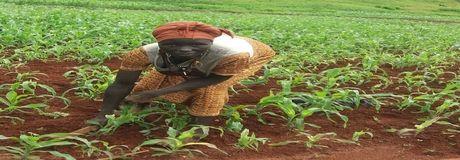Pathways into employment for refugees and Ethiopians

The German Government supports Ethiopia’s commitment to creating job opportunities for refugees and Ethiopians. What can this look like in practice? Learn more by reading the story of Amina, who now has a steady income thanks to a newly established irrigation system in Benishangul-Gumuz.
Amina is a 36-year-old woman from Sudan. Eight years ago, she fled her home country and came to Ethiopia. Together with her husband Beshir and their seven children, she lives in the refugee camp Bambasi in Benishangul-Gumuz, a region bordering Sudan and South Sudan.
Though she is now able to provide for herself and her family, their living situation had been different for a long time. Her family had been dependent on food rations for many years. In order to have enough money for the family, Amina was forced to take two of her children out of school to either collect firewood or to be hired as daily labourers.
Improving employment prospects for refugees and Ethiopians
Amina's life situation and that of her family changed for the better when, in 2020, she was given the opportunity to participate in an agricultural training. Alongside other refugees and Ethiopian participants from the host community, she learned how to grow different vegetables, control pesticides, use irrigation systems and manage agricultural land. Equipped with farming hand tools, such as watering cans and various vegetable seeds, Amina started cultivating a plot of land together with her refugee and Ethiopian co-workers.
Maize, soya beans, ground nuts and local cabbage are growing in their field. The positive impact on everyday life is plain to see. The agricultural producer group’s harvest is not only sufficient to meet Amina’s family's needs but also allows her to sell part of it at the market and thus generate an income for her family. “The income helps me to cover expenses for my children, such as clothing, and fill other household needs,” says Amina. Two of her daughters are back at school as Amina can afford her children’s school expenses.
Increasing agricultural yields through a new irrigation system
Amina believes that her situation will continue to improve. A new irrigation canal has been constructed close to her group’s plot of land. This is where the Ethio-German Qualifications and Employment Perspectives for Refugees and Host Communities in Ethiopia Programme (QEP) comes in. On behalf of the German Ministry for Economic Cooperation and Development (BMZ) and in cooperation with the Ethiopian Ministry of Labour and Skills (MoLS), the Deutsche Gesellschaft für Internationale Zusammenarbeit (GIZ) GmbH, in cooperation with the non-governmental organisation Lutheran World Federation, enhances agricultural employment prospects for 200 refugees and 200 Ethiopian host community members in and around the refugee camp Bambasi.
For Amina and the other farmers, the approach is bearing fruit: Thanks to the new irrigation system, Amina and her co-workers will no longer have to fetch water themselves since the plants are supplied with enough water through the canal. This makes it possible to cultivate the field several times a year increasing the annual yield and thereby ensure a steady source of income for the agricultural producer group.
Improving employment prospects for refugees and Ethiopians
But it is not only in and around the refugee camp Bambasi that refugees and Ethiopians have been able to improve their employment prospects. As a result of the GIZ-implemented programme, more than 3,300 refugees and Ethiopians were directly employed across Ethiopia: in Somali, Gambella and Benishangul-Gumuz regions as well as in Addis Ababa.
About the programme
On behalf of the German Ministry for Economic Cooperation and Development (BMZ), the Ethio-German Qualifications and Employment Perspectives for Refugees and Host Communities in Ethiopia Programme (QEP) provides technical advice to vocational colleges to set up the necessary institutional structure for an inclusive and market-driven training provision. In remote regions and in refugee camps, the range of employment-relevant vocational training is being increased. The programme supports the further training of trainers, labour market-driven revision of curricula and the establishment of partnerships between TVET colleges and companies.
Author: Victoria Baumann